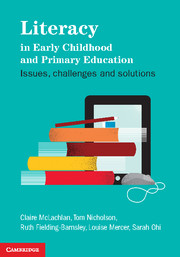Book contents
- Frontmatter
- Contents
- List of figures
- List of tables
- About the authors
- Acknowledgements
- Chapter 1 Introduction
- Part 1 Literacy acquisition: the child, the family and diversity in the modern world
- Part 2 Learning about literacy in early childhood settings
- Part 3 Literacy learning in the primary school
- Part 4 Literacy learning in the senior primary school
- Chapter 14 Extending reading and writing in the senior primary school: focus on factual writing
- Chapter 15 Struggling readers: issues and solutions
- Chapter 16 Conclusion
- References
- Index
- References
Chapter 15 - Struggling readers: issues and solutions
from Part 4 - Literacy learning in the senior primary school
- Frontmatter
- Contents
- List of figures
- List of tables
- About the authors
- Acknowledgements
- Chapter 1 Introduction
- Part 1 Literacy acquisition: the child, the family and diversity in the modern world
- Part 2 Learning about literacy in early childhood settings
- Part 3 Literacy learning in the primary school
- Part 4 Literacy learning in the senior primary school
- Chapter 14 Extending reading and writing in the senior primary school: focus on factual writing
- Chapter 15 Struggling readers: issues and solutions
- Chapter 16 Conclusion
- References
- Index
- References
Summary
Chapter objectives
To guide teachers in recognising pupils who may be at risk of developing reading difficulties.
To guide teachers in implementing suitable intervention with the assistance of families and providers for pupils with reading difficulties.
This chapter explores what happens when reading goes wrong. It investigates the origins of reading failure from the perspective of those who have lived the experience and covers the research literature associated with reading failure. This chapter also examines research evidence around ‘Matthew effects’ for pupils who get off to a slow start in reading, as well as issues of diagnosis of dyslexia and other reading-related disorders and the implications for educational practice. We discuss some of the recent moral panic around boys’ literacy achievement and review the research evidence related to boys’ achievement. The challenges for parents of pupils with reading difficulties are examined, along with the long-term implications for pupils with reading difficulties. Finally, the chapter reviews the roles of families, communities and agencies in supporting pupils with reading difficulties in the junior school and those with more persistent difficulties as they progress into the senior school.
The origins of reading failure
Pupils in our classrooms who demonstrate dificulties in learning to read are usually referred to as having a reading (or learning) difficulty or a reading (or learning) disability. It is important to understand these terms and also to appreciate the differences between them.
- Type
- Chapter
- Information
- Literacy in Early Childhood and Primary EducationIssues, Challenges, Solutions, pp. 276 - 291Publisher: Cambridge University PressPrint publication year: 2012



